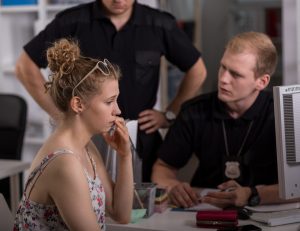Does the thought of sitting down to talk with the police make you sick to your stomach? It’s always stressful when the police bring you to the station for questioning. Keep reading for tips on what not to say when brought in for questioning so that you don’t blow your defense before you’ve even met your attorney.
Common Police Encounters

Be careful what you say with the police
Not all police encounters are the same and what you might say depends on the circumstances of the meeting. Here are some of the possible interactions that you’re likely to have with a member of law enforcement.
Voluntary Encounter – Most of the time you interact with a police officer in an informal way known as a voluntary encounter. You know it’s a voluntary encounter when you’re free to leave at any time. In this situation, you’re not obligated to give your name or answer any questions.
Temporarily detained – When you aren’t under arrest, and you’re not free to leave, the police have briefly detained you while they determine if there is reasonable cause for an arrest. In this case, the law states that you must tell the officer your real name, but you don’t need to answer any further questions.
Arrest – Expect an officer to tell you that you are under arrest and give you the reasons for the arrest. Listen carefully as the arresting officer reads you your constitutional rights as a criminal defendant. Make sure that you exercise your rights until an attorney advises you on your next step.
Once the police bring you to the station for questioning it’s crucial that you don’t make a mistake that can hurt your future defense. Let’s look at what not to say when brought in for questioning.
Your Rights Regarding Questioning By The Police
The United States isn’t a police state, and it’s essential that you know that you do have rights when being questioned by the authorities. Your rights come from the Bill of Rights in the United States Constitution. Examples of the powers that come into play when brought in for questioning include:
- Right to remain silent
- Right to a criminal defense attorney
What To Say To The Police
There’s no getting around the fact that sitting down in an interrogation room to speak with law enforcement officers is a scary situation. Remembering that you have rights can help to reduce any panic that you might feel while also protecting your criminal case when accused of a crime.
Experts say that you need to be careful about what you say when you’re speaking with law enforcement. Staying smart when you’re brought in for questioning is simple if you remember that, in most cases, you don’t have to give information to the police. The safest thing to do if you end up at the police station is to
- Say that you won’t answer any questions
- Request to speak with an attorney
Lastly, knowing what not to say when brought in for questioning is simple if you stick to the tried and true strategy of keeping your mouth shut until you meet with an attorney. You have the constitutional right to refuse to answer questions, and you’re usually smart to wait to chat with the cops until after you’ve spoken with your lawyer.
If your questioning session results in an arrest, you can count on us to help you post bond so that you can work on your defense from outside a jail cell. Contact us at Gibson Bail Bonds for smart solutions to your bail bond needs today.


